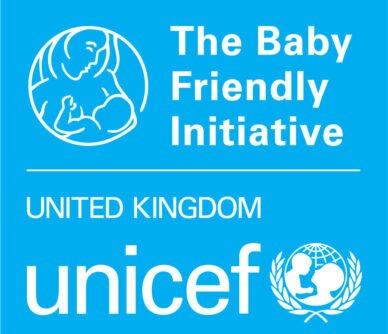26 February 2018
With all maternity units in Scotland accredited as Baby Friendly, the findings from the 2017 Scottish Maternal and Infant Nutrition Survey highlight how Baby Friendly practices positively impact infant feeding.
Many congratulations to the Scottish government for conducting the survey and for the strategic approach they have taken to improving breastfeeding outcomes in Scotland, and to all those working in infant feeding to support mothers, their babies and families.
Breastfeeding rates
It is impressive that at six months 43% of infants in the survey were receiving breastmilk, compared to 32% in the 2010 infant feeding survey,* an increase of 11% of all mothers. Whilst breastfeeding initiation rates remain fairly static (75% in 2017, 74% in 2010) and breastfeeding prevalence rates drop off in the early days (69% at four days, 66% at one week) there was a significant increase (5% of all mothers) in breastfeeding rates at six weeks (50% in 2010 to 55% in 2017).
The Baby Friendly Initiative standards recommend that families are provided ongoing, face-to-face support with feeding, right from initial considerations during pregnancy, through to getting breastfeeding off to a good start, to continuing breastfeeding for as long as mothers wish. A key part of Baby Friendly practice is supporting breastfeeding initiation through skin-to-skin contact; it is a credit to all maternity services in Scotland to see that 86% of all mothers and babies have skin-to-skin contact at birth (93% of vaginal births and 73% caesarean sections). The results highlight that supporting breastfeeding initiation as soon as possible after birth whilst the mother is in hospital has a positive impact; for example, the six week breastfeeding rate was markedly higher (86%) among women who were exclusively breastfeeding at discharge.
Overcoming challenges
It is encouraging that 89% of mothers who experienced problems with breastfeeding indicated that they received help with or information on these. However, women in Scotland, like the whole of the UK, live in a culture where bottle feeding is the norm, and 75% of mothers who stopped breastfeeding their infants reported that they would have liked to have given breastmilk for longer. The key reasons for stopping earlier than wished were concerns about feeding problems (49%), milk supply (45%) and finding it “too difficult” (25%). Whilst services have improved, this study reinforces the need for professional, ongoing support to manage these problems, as required by the Baby Friendly Health Visiting and Children’s Centre standards. Encouragingly, 68% of respondents who were breastfeeding had done so in public, an increase of 8% of all mothers from the 2010 survey.
Maximising breastmilk
In order to maximise child health outcomes, the Baby Friendly Initiative, in line with the WHO and UK governments’ recommendations, promotes exclusive breastfeeding to six months. In order to achieve this goal, the Baby Friendly standards require that health professionals support mothers to maximise the amount of breastmilk their baby receives. At the same time, with the survey showing that by 8-12 weeks only 25% of all babies had not received infant formula at some stage, it is also important that families who formula feed are supported to do so as safely as possible, and services are required to demonstrate this support when implementing the Baby Friendly Initiative standards. Positively, the majority of respondents who formula fed knew how to clean feeding equipment (83%), to only make up one feed at a time (71%) and to only use first stage milks (98%).
Even more encouragingly, mothers in Scotland are introducing solid foods later. In this report 96% of all respondents waited until their baby was at least four months old before introducing other foods and 46% waited until six months. In the UK in 2010, only 60% of mothers waited until their baby was four months old and 75% of mothers had started solids by the time their baby was five months old.
Sick and premature infants
A key part of the Baby Friendly standards is supporting mothers to understand the importance of breastmilk on their baby’s health and wellbeing outcomes. Whilst one in five women who took part in the survey said that they intended to formula feed their infants, 51% of these mothers said that if their baby was born sick or premature they would breastfeed or express milk for their baby. Among the small group of respondents who had given birth before 32 weeks, all of them had breastfed or expressed breastmilk for their baby. Scotland is supporting all neonatal units to become Baby Friendly, and the Baby Friendly neonatal standards require that services enable babies to receive breastmilk and to breastfeed when possible. The Princess Royal Maternity Hospital Neonatal Unit in Glasgow is one of the first neonatal units in the UK to receive full UNICEF UK Baby Friendly accreditation.
UK-wide data needed
Scotland’s survey provides invaluable insights and highlights many positive aspects of families’ experiences of maternal and infant nutrition. Without such benchmark data we can’t know if there is progress, where the biggest challenges for women are, and how best to enable them to breastfeed. The Baby Friendly Initiative is advocating for all UK governments to collect this robust data, in order to support evidence based policy-making and service provision. Add your voice to our Call to Action campaign, asking governments to take four key steps to improve infant feeding practices in the UK, including reinstating the National Infant Feeding Survey.
*The last UK National Infant Feeding Survey (McAndrew et al, 2010) was carried out in 2010. Whilst not directly comparable, both surveys gathered data from respondents over a set period of time. 2010 data from Scotland was analysed separately from the rest of the UK and has been used to illustrate some changes over the last seven years.



